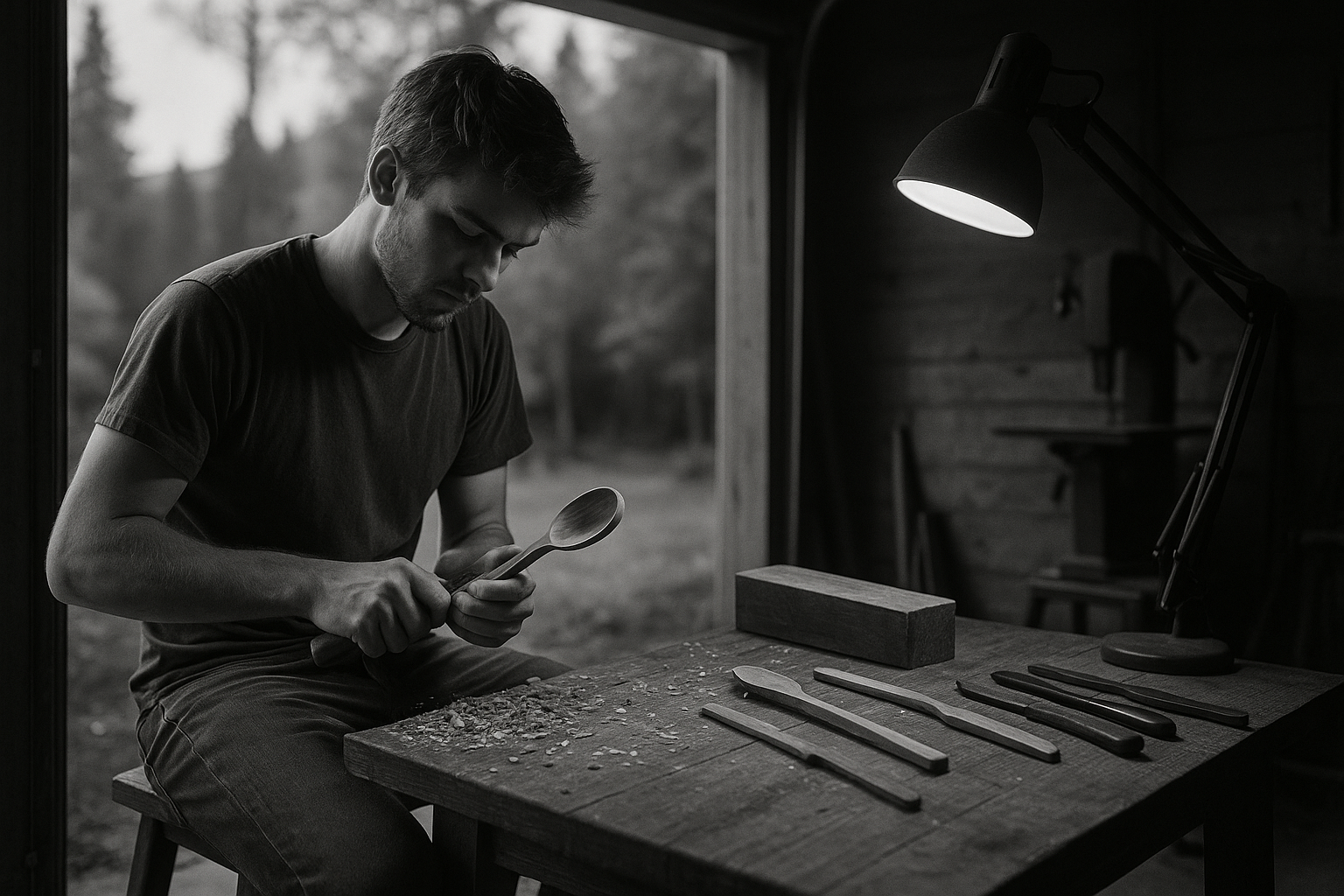The Wood

A Woodworker Sculpting a Spoon
In the pine-shadowed edge of Shingletown, just east of where the road begins to climb again toward Lassen, one of those blessed towns where the elevation in feet outnumbered the town’s population, a young man worked with wood.
He did this most evenings, in the back corner of his parents’ detached garage.
He was somewhere between college and career— not stranded, exactly, but the in-between had lasted longer than he’d expected.
Friends had moved on—jobs, cities, apartments with thin walls and tall rent. He had stayed behind, in the old house at the end of Thumper Drive, one of several streets in the neighborhood named, inexplicably, after cartoon deer and rabbits. The names never quite fit the hush of the trees or the weight of the winters, but somehow they suited the in-between-ness of things—a reminder that not everything had to make perfect sense right away.
He lived in the part of Shingletown named Shasta Forest Village, a quiet stretch of pine-lined roads just off California Highway 44.
The neighborhood was small, just a few hundred people, but walkable, friendly, the kind of place where neighbors dropped off baskets of tomatoes in late summer and called out greetings from their driveways.
The homes had deep decks and wide windows, many with views of Mount Shasta, her snowline faint in the distance like a blessing. It was a FireWise community, which meant the edges were watched and trimmed,
but the forest still pressed close.
It was quiet here, but not empty. And in that space—between trees and neighbors, between not-yet and maybe-soon— he began to turn toward wood.
The back corner of the garage had once stored lawn chairs and holiday boxes, but he’d swept it clean, strung up work lights, and slowly claimed it as his own.
His parents were kind about it.
They traveled often now—visiting grandchildren in Santa Barbara and Bend, checking in with a kind of lightness that didn’t press him.
There was a gas furnace in the garage corner— the old owner had installed it for winters when the snow piled high and stuck around. That little furnace, ticking on in December, became its own sort of companion.
Over two years, he’d gathered tools bit by bit—a secondhand lathe, a bandsaw from Redding Craigslist, a drill press his uncle had given up on.
At first he tried making bigger pieces—cutting boards, a small stool, even a coat rack no one quite needed. But in early summer, he picked up a small offcut of olive wood at the lumber yard—bought it impulsively because it felt so good in the hands, warm and smooth like something already held a hundred times. He didn’t know what he’d use it for. But a few days later, he carved a spoon that felt like a sculpture—and something in him clicked. It felt like stumbling into a hidden valley after hiking through fog.
He began sculpting spoons and spreaders, butter knives and tiny scoops—kitchen gifts that felt both humble and generous.
He worked mostly by hand, refining curves with a spokeshave, hollowing bowls with a hook knife, sanding slowly until the grain emerged like water through paper.
The walnut smelled like smoke.
Maple felt calm under his thumb.
The manzanita, though beautiful, cracked easily.
He learned not to rush. The wood always seemed to know it had been rushed, and it found a way to push back.
One afternoon he brought a spoon into the house—smaller than he’d intended, its bowl too shallow by standard measures.
But his mother had stood by the stove, taken one look, and smiled. “This is perfect for adding a pinch of nutmeg or sugar,” she said, setting it beside her olive oil like it had always belonged.
Then there was the spoon/spatula, in a unique shape that he created, just because it "felt right"... she told him it worked perfectly for stirring ingredients into sourdough or portioning out no-bake cookies onto the wax paper sheet. He hadn't meant for it to be useful, exactly-just to feel right in the hand. It did both!
He watched for her to use them in the kitchen, and even when she didn’t, he liked knowing they were there waiting. Gifts offered in love often know how to make themselves needed.
He gave more away.
To the neighbor who still canned peaches every fall,
to his sister, who sent back photos of jam spread on toast,
to a friend who kept one in a ceramic jar beside her tea.
They weren’t grand things.
But they were things people reached for with familiarity—used, washed, returned to the drawer with care.
That felt like something.
Most evenings, after dinner, he opened the garage door to let in the breeze. Even in the middle of summer, the cool air found its way over the coastal range and into the trees around Shingletown. It was one of the things he liked best about the place.
He’d turn the light on over the workbench, brush the shavings into a pile, and pick up where he’d left off.
The work didn’t answer the bigger questions, but it gave him something to do with his hands. Something that started rough and finished smooth. Something he could give away.
Sometimes, someone would hold one of his spoons—turn it over, test the balance, run a thumb across the bowl like they’d done it before. Those moments landed differently. They made the hours feel like they’d gone somewhere.
On the bench tonight: a block of walnut, still uncut.
He picked it up, weighed it in his hand, and began again.